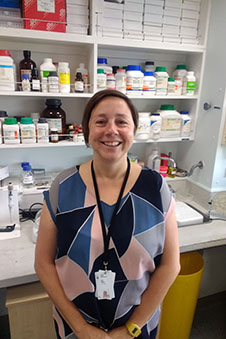Research predicting the impact on heart muscle during a heart attack is being unravelled in the field of genetics, in a ground-breaking study, using human heart tissue.
Looking at a particular type of gene product called long non-coding RNA, this mysterious side-kick generated by the part of our genome which was once considered 'junk', is emerging as a potential novel predictor of heart health.
Taking current knowledge to a new level is a collaboration between the Christchurch Heart Institute (CHI), and Brigham & Women's Hospital in Boston, USA, home of Harvard Medical School.

Zoe Ward, PhD student
Zoe Ward, PhD student in the CHI's Molecular Biology Laboratory, is analysing data, obtained via heart surgery by the Harvard team, to gauge the significance of the link between long non-coding RNA and heart attacks.
“The Harvard team operated on 85 volunteer patients who were requiring cardio pulmonary bypass. Blood must be diverted from the heart to allow the operation and the heart is temporarily starved of its normal supply of blood and oxygen. This partially and safely simulates what happens when a patient's coronary arteries around the heart become blocked during a heart attack. A tiny biopsy of heart muscle was taken before and after the surgical “heart attack”. These tissue samples hold the genetic information that will help us see what changes in long non-coding RNA, which turn selected genes on and off, are occurring during a heart attack. This gives us a better understanding of the biology that is happening and potentially therapeutic targets” said Zoe.
Zoe applies her exceptional skills in a specialist area of computer-based medical data analysis called bioinformatics to search through terabytes of data. Exploring new areas of the genome, Zoe has potentially found 86 possible new non-long coding RNAs. Because long non-coding RNAs are known to be tissue specific, these may be unique to the heart.
“I aim to find out which of the non-coding genes, potentially responsible for generating long non-coding RNAs, are turned on or off when the heart is under stress. This will give us some insight into what these genes do and how they may turn other genes on or off, to help support the heart at a time of crisis.”
Because new, novel, genes are studied, the current software is modified for 'boutique' analysis. Modifications have been made by Zoe with support from her supervisors, Dr Sebastian Schmeier of Massey University, as well as Dr Anna Pilbrow and Professor Vicky Cameron of the CHI and Associate Professor John Pearson at the University of Otago, Christchurch. The data is set up and analysed on a powerful computer dedicated to bioinformatics analysis at University of Otago, Christchurch.
“I am in a privileged position to have access to the data from Harvard.” said Zoe, “The number of patients is rare – offering more scope for accuracy. I am always appreciative of the people who volunteer to be involved, this wouldn't be possible without them.”
Media contact
Paula de Roeper
Christchurch Heart Institute Communication Manager
Tel +64 27 316 0571
FIND an Otago Expert
Use our Media Expertise Database to find an Otago researcher for media comment.
